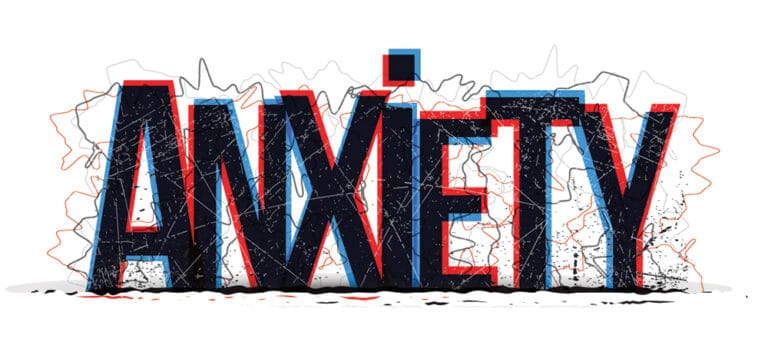If anxiety is stopping you from getting good sleep, you’re not alone. Nighttime anxiety is an issue for many people with anxiety disorders, who often find their evenings filled with a sense of apprehension, worry, and uneasiness.
Anxiety at night can stop you from sleeping, while a lack of sleep can increase your anxiety. The good news is, there are a few ways to maintain your anxiety so you can rest, function the following day, and live a fulfilling life.
Why anxiety increases at night
There’s no one explanation as to why you feel more anxious at night, but rather, it can result from a few things.
One reason why is that when the lights go down and it’s quiet, there are fewer distractions and more opportunities for your worrisome and ruminating thoughts to arise. Having difficulty falling asleep can also unleash its own set of worries, including how it’ll impact your functioning the following day.
Other reasons why you may feel more anxious at night can include:
- Drinking too much caffeine throughout the day or too close to bedtime can make you jittery and more anxious.
- Experiencing a recent traumatic event.
- Health anxiety or noticing physical aches and pains while trying to fall asleep.
- Worry or fear over the next day.
Signs and symptoms
While everyone experiences anxiety differently, symptoms of nighttime anxiety may include:
- Aches and pains
- Difficulty breathing
- Heart palpitation
- Feeling nervous or restless
- Uncontrolled or racing thoughts
- Difficulty falling and staying asleep
- Nightmares
- Gastrointestinal problems
- Panic attacks and nocturnal panic attacks
Tips for managing nighttime anxiety
The good news is that you can do a few things to help reduce your anxiety at night and allow yourself to have a relaxing and restful night’s rest.
Set an intention early on. Many of us go from one task to the next throughout our day without considering how we’re feeling or how we’d like to feel. For example, do you ever get home after a long day of work and think to yourself, “I want to relax and enjoy this evening?”
Most likely, you’re far too busy with other things to stop and think about how you want your evening to look like. However, by setting an intention early on, you’re more likely to get the results you want. If you remind yourself every day that you’re determined to have a relaxing and peaceful evening, you’re more likely to experience it that way.
Learn to be in the here and now. Like not being in touch with how we want to feel, most of us spend a lot of our time completely detached from the present moment. But by making an effort to be more mindful, you may be better able to enjoy your evening.
Mindfulness can stop you from going over every worry in your mind and allow you to recognize that you don’t always have to react to every thought that pops in. Mindfulness is a skill that you can learn by doing various activities, such as mindfulness meditation.
If mindfulness seems like it’d be too time-consuming to practice, try to make an effort to be more present and aware of your day-to-day life as it is, rather than searching your mind for worries and fears.
Make time for transitions. Transition time is the time between tasks. A lot of us may underestimate how much transition time we need. For example, your evening can consist of numerous tasks that you need to complete before going to bed.
Whatever amount of time you have set aside for each task, consider adding a few more minutes as a buffer in case it takes longer than you think. That way, you’ll avoid feeling overwhelmed, trying to get too much done before going to bed.
Establish and maintain a bedtime routine. Establishing a bedtime routine allows you to focus on taking proactive steps to unwind rather than ruminating in worries and anxious thoughts.
Your bedtime routine can include taking a warm bath to read a new book, to listen to music.
Regardless of what you choose, your bedtime routine should be set to help you rest better.
Don’t include anything that may be too overstimulating, such as reading through social media or watching a horror film. Instead, make it quiet and relaxing so that when it’s time to fall asleep, you’ll be ready.
Finding help for anxiety
If your anxiety is making it tough to function, you may want to consider scheduling an appointment. Anxiety is treatable, and with the help of therapy and medication, you can learn to manage it healthily.
Call or request an appointment at Abbey Neuropsychological Clinic to learn more. The outstanding team at Abbey Neuropsychology Clinic in Palo Alto, California, has extensive experience evaluating anxiety and designing personalized treatment plans using the most advanced therapeutic techniques to address anxiety symptoms and related conditions. If you have questions about anxiety disorders, assessment tools, or treatment options, or you’d like to schedule an appointment, call the office today.
The clinic is now offering telehealth to clients in Palo Alto, Los Altos, Los Altos Hills, Woodside, Menlo Park, Atherton, Napa, Orinda, Hillsborough, Belvedere Tiburon, Blackhawk, Noe Valley, Malibu, Beverly Hills, and La Jolla.
Sources
https://www.nimh.nih.gov/health/topics/anxiety-disorders/
https://health.clevelandclinic.org/how-to-calm-your-anxiety-at-night/
https://www.mindful.org/meditation/mindfulness-getting-started/






